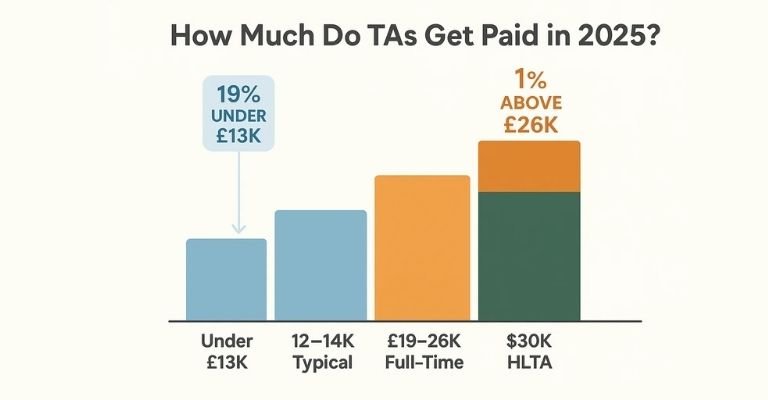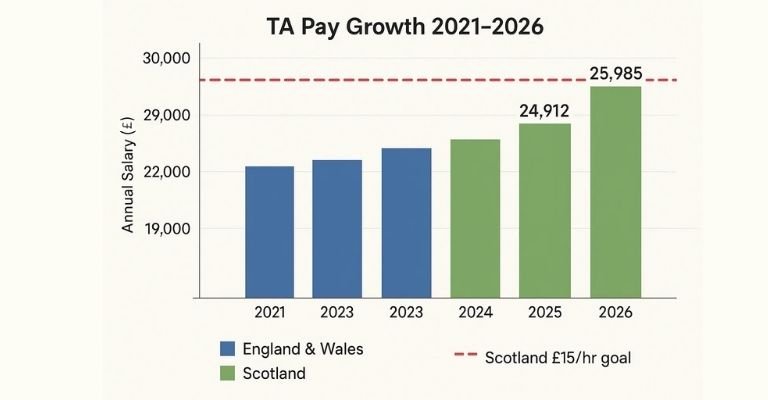Subtotal:
£25.99
Have you ever wondered what TA wage really looks like? Many people assume teaching assistants earn solid salaries, but the reality is often different. While TAs play a central role in children’s learning and teachers’ workloads, their pay often doesn’t reflect that importance.
The surprising truth is that many TAs take home around £12,000–£14,000 a year, even though official job adverts show £19,000–£26,000. This gap can leave hardworking staff juggling extra jobs or even leaving for better-paid work outside schools.
In this article, we explore teaching assistant pay in detail. You’ll discover how much do TAs get paid in 2025, why wages are often tied to the minimum wage, how pay differs between schools and universities, and what might change in the future. By the end, you’ll have a clear picture of TA wages 2025 and what to expect if you are considering this role.
What Teaching Assistants Really Do
Teaching assistants play a key role in schools. Here’s what they do:
- Support learning – Help children with SEN and those needing extra attention.
- Promote wellbeing – Assist with mental health and pastoral care.
- Medical tasks – Some TAs administer medication or monitor health needs.
- Classroom management – Lead small groups and support teachers.
- Communication – Connect teachers, students, and parents to ensure smooth learning.
How Much Do TAs Get Paid in 2025?

Full-time advertised pay for TAs ranges from £19,000 to £26,000. Higher Level TAs can earn up to £30,000. However, most take home less because term-time contracts reduce total income. Many TAs earn around £12,000–£14,000 a year.
Only about 1% of TAs earn above £26,000. Meanwhile, 19% earn under £13,000. Pay varies depending on experience, location, and school funding. TAs in London or high-cost areas often earn slightly more.
Why Advertised TA Wage Look Higher Than Take-Home Pay
When looking at ta wage, the numbers in job adverts can be misleading. Many TAs have term-time only contracts, which means they are paid for 39 weeks instead of 52.
For example, a salary advertised as £19,000 per year “on paper” usually comes to around £14,000 in reality. This is because TAs do not earn during school holidays or non-term weeks.
About four in five TAs are affected by this structure. Even though advertised pay looks reasonable, the actual take-home pay is often much lower, leaving many TAs juggling extra jobs or relying on other income sources.
The Real Driver of TA Wages: National Living Wage
Many people assume TA pay is set by education policy, but the reality is different. TA wage is largely influenced by the National Living Wage (NLW), which sets a legal minimum that employers must pay.
In 2025, the NLW reached £12.21 per hour. This rise forced local councils and schools to lift the minimum pay floors for teaching assistants. As a result, the lowest TA hourly rate is now around £12.65 per hour, equivalent to approximately £24,400 full-time per year (FTE).
This shift helps ensure TAs receive fairer pay, but many still work part-time or term-time contracts, which reduces actual annual earnings. Even so, the NLW acts as a crucial safety net, preventing schools from paying below-living wages.
Why This Matters
- Fairer baseline: Local councils must adjust pay to meet the NLW.
- Pressure on schools: Budget planning must account for higher minimum TA pay.
- Impact on advertised salaries: While £19k–£26k is still typical, the NLW ensures the lowest-paid TAs earn closer to £24k full-time equivalent.
- Regional differences: London and high-cost areas often pay above this minimum to cover living costs.
How TA Pay Changed from 2021 to 2025

TA pay has increased steadily over recent years:
- 2021: Flat rise of £1,925
- 2023: Another flat rise of £1,925
- 2024: Flat rise of £1,290
- 2025: 3.2% increase for all TAs
In Scotland:
- 2025: 4% rise
- 2026: Planned 3.5% rise
- Goal: £15/hour by 2026
These increases show a gradual improvement, but actual take-home pay still depends on term-time or part-time contracts.
The Catch With TA Wage Rises
Many people assume that all school pay rises are equally funded. However, TA wage increases are different. Government funding covers teacher pay rises, but TAs are not included.
As a result, schools must find the money for TA pay increases from their own budgets. This creates tough decisions for school leaders. Often, schools:
- Reduce TA hours to stay within budget
- Cut term-time weeks or shorten contracts
- Freeze new TA hires or even make roles redundant
These measures help schools meet pay rises for TAs without overspending, but they can affect job security and income stability.
Why Many TAs Think About Leaving
Low pay and challenging working conditions drive many teaching assistants to consider leaving. Petition evidence shows that almost half of TAs are actively job-hunting, while 28% hold second or even third jobs to make ends meet. Financial pressure affects some TAs so severely that they rely on food banks to support themselves and their families.
Many TAs switch to jobs outside schools, such as supermarkets, retail, or hospitality, where pay is higher, hours are more stable, and benefits can be better. Other reasons include stress, high workloads, and limited career progression. Despite being essential to children’s learning, TAs often feel undervalued, which adds to turnover.
Key Points
- Job-hunting: Almost 50% of TAs look for alternative roles
- Multiple jobs: 28% work second or third jobs
- Financial struggle: Some rely on food banks
- Better pay elsewhere: Supermarkets and retail often pay more
- Workload stress: Heavy responsibilities and limited career growth contribute to leaving.
How to Become a Teaching Assistant with No Experience
You’ve just read about what teaching assistants do and about TA wages. Now, learn how to become a teaching assistant with no experience. Check out our guide to see simple steps, courses, and tips to get started quickly.
University TA Pay in 2025
If you’ve ever wondered how much a university TA earns, the answer might surprise you. Most are paid by the hour, usually £16–£20, plus holiday pay. It sounds decent, but many TAs only work a few hours each week. That means total yearly income stays low, which can be stressful if you rely on the role to cover bills or living costs.
Some universities are trying to improve things. For example, Sheffield’s 2024 deal gives TAs 20+ guaranteed hours per week, pays for preparation time, and even includes sick pay. This helps TAs feel more stable and secure.
The UCU wants all universities to follow Sheffield’s example. Their goal is clear: fair pay and steady hours so TAs feel valued instead of overworked or stretched too thin.
What Could Fix TA Pay for Good
Many teaching assistants feel undervalued, and low pay is a big reason why. But things could get better. Unions suggest a £15/hour minimum, a national pay scale, and a clear career ladder. This would give TAs fair pay and a way to progress in their careers.
Better school funding would also help TAs feel more secure and appreciated, instead of stressed about hours or money. If schools had more money, they wouldn’t need to cut TA hours or jobs to cover pay rises. This would give TAs more security and peace of mind.
Recognising the expanded role of TAs after Covid is important. Many TAs now support SEN pupils, mental health, pastoral care, and even medical tasks. Paying them fairly would show respect for this extra work.
Other improvements could include:
- Extra training and professional development, giving TAs new skills and confidence.
- Flexible hours for those balancing family, studies, or second jobs.
- Support for wellbeing, such as counselling or stress management, which helps retain staff.
Rewarding TAs properly would make them feel valued, reduce stress, and encourage experienced staff to stay in schools.
Quick Takeaways on TA Wages
Most teaching assistants take home around £12–14k, not the £20k+ that job adverts often show. This gap can feel unfair. Pay has risen between 2022 and 2025, but much of the increase comes from minimum wage laws rather than extra school funding.
Scotland is leading the way with a £15/hour pledge, giving TAs there more security and recognition for their work. University TAs are making progress, winning small but important improvements like guaranteed hours and prep pay. These changes really help with job stability. However, without more funding, future pay rises could come at a cost, such as fewer TA jobs or shorter hours, which would be stressful and unfair.
Final Word
Teaching assistants are the unsung heroes of schools and universities. They support children, help teachers, and keep classrooms running smoothly. Yet their pay often doesn’t match their value. Many TAs struggle financially, despite taking on important responsibilities every day.
It’s clear that fair pay, better hours, and recognition are long overdue. By valuing TAs properly, schools can keep skilled staff and improve learning for all.
Take Action
If you’re interested in a rewarding career as a teaching assistant, learn the real pay, responsibilities, and opportunities before you start. Check out our TA training courses at Wise Campus to boost your skills, increase your confidence, and step into a role that makes a real difference.
Start your journey today and secure a brighter future in education!
FAQs
1. What does a TA earn per hour?
If you get paid daily, you’ll usually earn £40–£60 a day, about £12.21 an hour.
2. How many hours a week is a TA position?
TA appointments usually range from 25% (about 10 hours per week) to 50% (about 20 hours per week).
3. Can a TA teach a class in the UK?
Yes, If you like, I can rewrite similar sentences throughout your blog in this easy, human, conversational style to make it flow naturally.
4. Will TAs get a pay rise in 2025?
Yes, UK teaching assistants (TAs) will get a 3.2% pay rise from April 2025, under the NJC support staff pay award.
5. Is being a TA stressful?
Yes, being a teaching assistant (TA) is considered a very stressful job.







